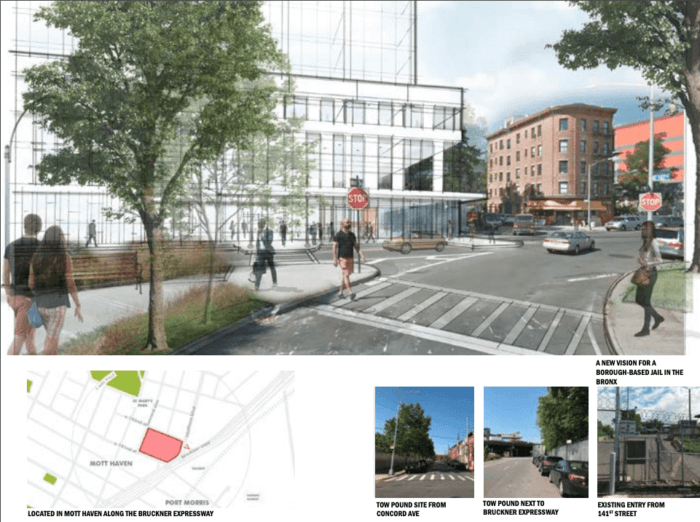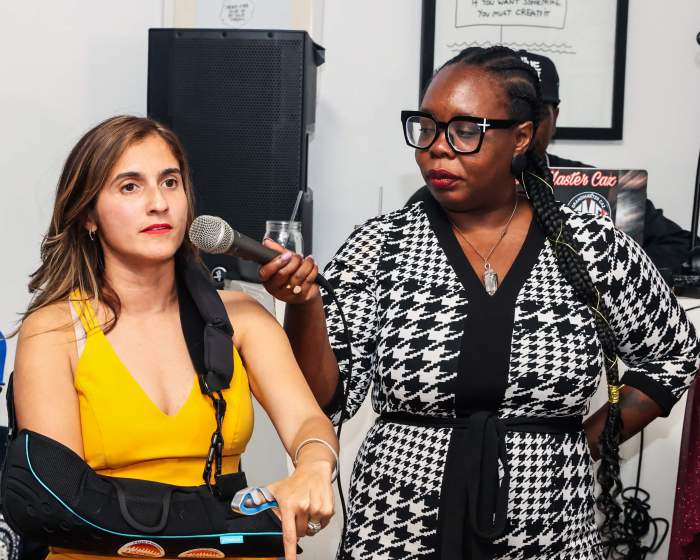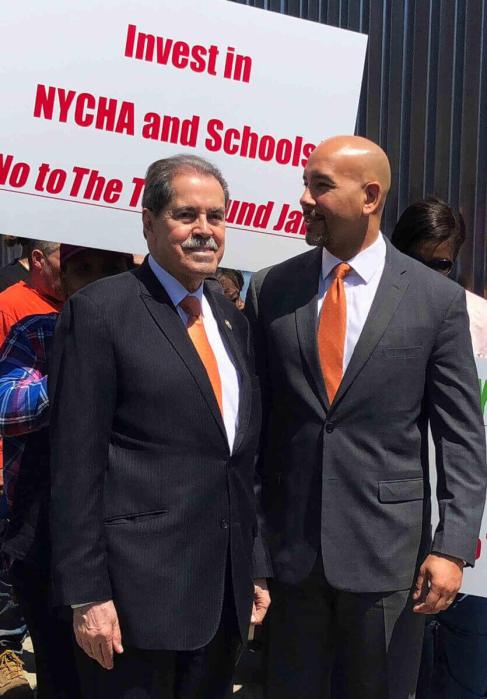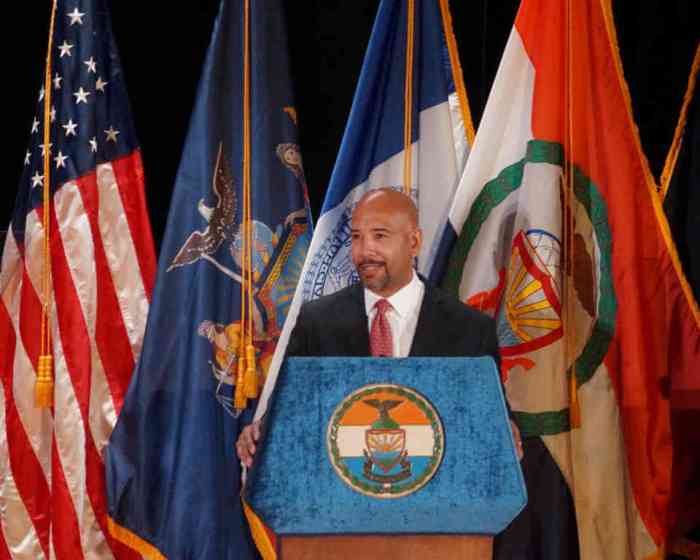The South Bronx’s 84th District has a myriad challenges over the next few years and residents are clamoring for leadership in Albany to fix these qualitative ills. While Mott Haven residents like Brenda Jackson fear gentrification on the heels of expedited waterfront development in recent years and continuing challenges with environmental health, residents of the Beekman Houses like Jesse Armstrong are increasingly concerned about community safety with an incoming city jail.
So what are the District 84 voters looking for in an Albany representative, come June 28? A few Democratic voters in the district told the Bronx Times that “there isn’t one issue” in the South Bronx to consider, but overall ways to improve community life are paramount.
Incumbent Assemblymember Amanda Septimo and her challenger, Alberto Torres, didn’t engage in a mudslinging, drag-out debate on Wednesday in the South Bronx. Instead, both candidates used Wednesday’s forum to tout their contrasting visions on how to improve the quality of life in a rapidly-changing, yet still underinvested South Bronx region as residential frustration builds.
Septimo, a youth leader in the Bronx dating back to 2005, is a fast riser in politics. Her first Assembly tenure has included sponsoring successful bills relating to the emissions of toxic air contaminants — which directly impact her district, one that has the highest asthma rates in the country — and a bill for equitable siting and construction of NYC-based methadone program facilities in the five boroughs.
Septimo said her goal for a possible second term is focused on community power — nonballot, non-office holding opportunities for constituents of the 84th District to make a change in the communities — and securing a strong South Bronx voting bloc.
An attorney, Torres has spent more than 30 years in civic service working for nonprofit agencies in the 84th District. Torres champions himself as a longtime advocate for families, seniors, young adults and students on community important issues, who would use his Albany pulpit to create direct change.
A third primary challenger Hector Feliciano, a college prep director, did not appear at Wednesday’s forum, citing a scheduling conflict.
Both Septimo and Torres believe that the South Bronx is underinvested and the region’s decline in qualitative life is a result of poor, yet, intentional policy. However, both differ in their approach to the South Bronx’s incoming challenges — such as how to respond to the incoming city jail that aims to meet the NYC Borough-Based Jails program’s goal of placing incarcerated people closer to their communities and closing the oft-controversial jails on Rikers Island.
NYC Department of Design and Construction is leading the design and construction of four borough jails, with the proposed location of the new Bronx jail at 320 Concord Ave., currently a NYPD tow lot in Mott Haven, just west of the Bruckner Expressway.
The Mott Haven location meets necessary site criteria in that it is owned by the city, located near public transit, and sits roughly three miles away from the Bronx County Hall of Justice. However, Bronx politicos like former Borough President Ruben Diaz Jr. argue that it’s far less accessible than an open site near Grand Concourse — the initial site proposed by the city until those plans were thwarted in city council, sources told the Bronx Times.

Each borough-based jail facility will house 886 beds and cost between $1.5-$1.8 billion The four jails will replace the widely-criticized Rikers Island, which currently houses about 5,700 incarcerated people, requiring the city to reduce the prison population by more than 2,000 by 2027, when the jails are expected to open.
Septimo said she hasn’t given up hope on fighting the jail’s siting — Mayor Eric Adams holds the final say on the future of the city jails — but said that protecting the nearby area should include better police response to crime in the area, where cops have historically taken longer to respond to South Bronx neighborhoods, police 911 data shows.
“I fought at every point possible to prevent this jail, and I haven’t given up hope that we haven’t lost all fight, but in the meantime we can make sure this community is getting it’s fair due,” said Septimo. “We also have to talk about how our city resources are being spent and how they’re being supported in our community or not. And this is an example of when it’s not.”
Torres said the city jail should be moved in proximity to the Bronx Courthouse, and that the constant shuffling of prisoners from city jail to courthouse will only exacerbate South Bronx’s climate and congestion issues. A jail formerly resided in the shadow of the old Yankee Stadium and operated until 2000, but was later torn down to make way for the Bronx Terminal Market shopping center.
Septimo, at Wednesday’s forum, said she sees herself as an amplifier of voices in an underinvested community.
“I want everyone to remember you don’t need a platform to do work. You don’t need to run for office to do work. You don’t need to put your name on a ballot to do work,” said Septimo. “I just encourage everyone to be mindful of people who say ‘elect me, and then I’ll work.'”
Torres said “getting on the ballot” and using a political platform is important to bring funding to District 84, and suggested that Septimo and other elected officials don’t follow through on making sure that state dollars are used in the Bronx.
“In order to get funding I have to go to Albany. In order to get funding and bring it down here I need you vote to hold people accountable,” said Torres. “What I hear (from elected officials), I go to Albany, I get money and I don’t know what happens to it. We have to be able to hold all the elected officials accountable. If the money is coming from (Albany) to the (Bronx), if the locals are distributing it, then as assemblymember I will put the pressure on local officials to influence the legislation necessary to ensure the money is going to come here.”
Other issues frustrating the District 84 residents, including housing, are evergreen to most New Yorkers and exacerbated by the district’s impoverished communities.
Torres believes that federal, state and city government have abandoned NYCHA housing projects, and allowed it to get to the point of decay, and would use his Albany platform for massive improvements for NYCHA housing. But he also made a comment on affordability that drew a fiery response from Septimo who noted the median household income in 2019 for the Mott Haven sections is around $26,350, which is 64% less than the citywide median household income of $72,930.
Torres and Septimo sparred toward the end of the forum, particularly when a question on income levels for leaders of nonprofits making six-figure salaries. While Torres stated that CEOs should not be receiving six-to-seven figure salaries, he noted that a decrease to the $300,000-$400,000 range would be “reasonable” if they are then investing money into the community.
“This is what I talk about when I say failed leadership. This gentleman next to me is being supported by people at the center of failed leadership and sitting here telling us that $300,000 to $400,000 for a nonprofit leader is acceptable when people in our community are struggling to make ends meet,” Septimo said.
As of Thursday, the winner of the Democratic primary on June 28 faces an open November general election.
Reach Robbie Sequeira at rsequeira@schnepsmedia.com or (718) 260-4599. For more coverage, follow us on Twitter, Facebook and Instagram @bronxtimes

























